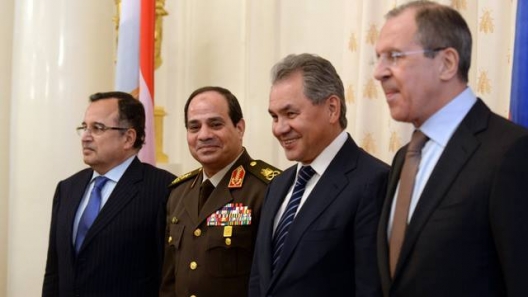 While the Gulf still seems hesitant about Field Marshal Abdel Fatah al-Sisi’s presidential candidacy, Russia has extended a warm welcome, perhaps more explicitly than is appropriate. The sentiment is evidenced by Sisi’s latest visit to Moscow, where Russian President Vladimir Putin himself officially welcomed Sisi, in violation of established protocol. This will increase the possibility of substantial Russian support for Sisi’s candidacy, which could mean providing international support in the face of expected American and European disapproval at the start of his term, or potentially economic and military support.
While the Gulf still seems hesitant about Field Marshal Abdel Fatah al-Sisi’s presidential candidacy, Russia has extended a warm welcome, perhaps more explicitly than is appropriate. The sentiment is evidenced by Sisi’s latest visit to Moscow, where Russian President Vladimir Putin himself officially welcomed Sisi, in violation of established protocol. This will increase the possibility of substantial Russian support for Sisi’s candidacy, which could mean providing international support in the face of expected American and European disapproval at the start of his term, or potentially economic and military support.
If elected, Sisi would need a massive economic transformation in the beginning of his term. He would need people who can support him in achieving rapid economic changes that would affect the impoverished. These changes must be enacted soon after taking office, to ensure Sisi can remain in office throughout his entire four-year term without facing any difficult periods.
The only solution would be for Sisi to launch several large nation-wide initiatives. While these would not yield returns in the short term, they will—or at least they should—attract a significant amount of labor. These initiatives would jump start the labor market, and in the short term, will quickly help address the issue of wide-scale unemployment.
Moscow is likely to support at least one such initiative, just as it offered support to Egypt in the 1960s in the building of the High Dam. Russia could offer technical and financial support for infrastructure projects, such as a nuclear energy plant to help solve Egypt’s energy problem, or a project around the Suez Canal that would include the creation of a global free trade zone.
News reports have indicated that Egypt and Russia have reached the final stage of negotiations over advanced defense systems, and for the first time in the history of the countries’ relationship, the two sides may have agreed on a supply of Russian MiG-29 jet fighter aircrafts. Yet it is still too early to debate whether this agreement represents a strategic change to the Egyptian army’s armament policies going forward, or what the relationship between such a change and Sisi’s presidential bid may be.
The Egyptian army’s thinking likely runs deeper, given the sudden and unexpected shift from its dependence on Western weapons systems—and the United States in particular—to its Russian counterpart. Yet it is clear that these deals will achieve several short term and long term goals.
In the short term, this move is a tactic to pressure the United States to quickly amend its position—not just with regards to the interim Egyptian regime and future regimes, but also with regards to the entire region. Since Saudi Arabia was a strategic ally to both Egypt and the United States at the same time, it is difficult for the Kingdom to apply the same tactical shift to both countries for various reasons, since Egypt has taken a big step towards balancing the relationship between these traditional adversaries, both global superpowers. Furthermore, unless the United States reads these signals and rectifies the situation quickly, this move may open the door to further steps that will expand Russia’s sphere of influence.
In the long term, this is a golden opportunity for the Egyptian army to significantly improve its armaments, compensating for the fact that the United States has banned the sale of F-15 jets, and instead sells these aircraft to Israel alone, ensuring the continued imbalance of power in Israel’s favor. As an aircraft, the MiG-29 is comparable to the F-15; yet more importantly, this move is intended as payback to the American administration, which has decided not to honor the F-16 aircraft deal following the events of July 3, 2013.
Moscow under Putin is not the same as Moscow under Khrushchev, and the only similarity Field Marshal al-Sisi shares with former Egyptian president Gamal Abdel Nasser is the popularity with the public that he enjoys. Thus, speaking of Russia’s support today offered in exchange for rising Russian influence is to forget that the issue is contingent upon new circumstances, which are fundamentally different from those of the sixties. The two sides do not share much in common, and certainly not enough on which to build a strategic alliance. This is particularly true given Russia’s role in Syria and its continued support for Bashar al-Assad, with Iran’s financial and ideological backing. Its position is in inevitable opposition to Egypt and the Gulf states, particularly given the failure of the Geneva conference, how fierce the fighting is, and how long it is expected to last.
In sum, the common denominator between the two sides seems to be hostility towards the Muslim Brotherhood. All Sisi truly needs from Russia’s support is solid ground to stand on, before returning to normal relations with the United States and its allies as expected—and with a new set of conditions and constraints. Meanwhile, Russia welcomes this strategic opportunity to compensate for its forty-year absence in the region, ever since former president Anwar Sadat decided to put an end to the work of Soviet experts in Cairo. It welcomes the opportunity to strengthen its position in the Middle East, especially with such a pivotal country as Egypt.
Nader Bakkar is a co-founder of Egypt’s al-Nour Party and serves as a member of the party’s presidential and foreign affairs committees, as well as the chairman’s assistant for media affairs.
Image: Photo: Egypt Armed Forces
![Egypt’s Presidential Elections: The Russian Factor [Part III]](https://www.atlanticcouncil.org/wp-content/uploads/2014/02/20140224Sisi.jpg)